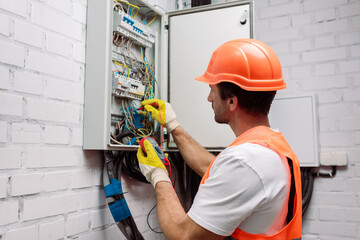Electricians are responsible for wiring homes, buildings, and other structures with electricity. They also work on transmission lines and related equipment. They may install new components or maintain existing infrastructure. Some electricians specialize in a particular type of electrical work. These individuals may also perform electrical testing. Some electrical contractors specialize in areas such as industrial and commercial facilities.

Electricians are needed in almost every building. Electricians are responsible for installing and replacing power systems. Alternative energy generation is also a growing field, so more electricians will be needed to link alternative power systems to homes and power grids. Government incentives may also help drive this growth. Regardless of where electricians are needed, the job outlook is promising.
Electricians may work alone or with other construction specialists depending on the location. At large companies, electricians may work with architects, elevator installers, heating and air conditioning workers, or other construction specialists. In smaller businesses, they usually work alone. In addition to their work, some electricians supervise a crew of helpers.
A high school education is required to become an electrician. Electrical apprenticeships take four years to complete. During the first three years, apprentices attend trade school one day a week. To become a licensed electrician, electricians must have completed electrical competence at Level 3. They must also have a card issued by the Joint Industry Board Electrotechnical Certification Scheme (JIBEC), allowing them to work in certain areas where electrical safety is required.
Electricians have a wide variety of skills. Their work involves reading blueprints and technical diagrams of electrical systems. They also use tools such as conduit benders, drills, and saws to install wiring. In addition, they use voltmeters, ammeters, and other tools to test connections. These tools are also useful in troubleshooting problems.
Maintenance electricians are usually employed in industrial and commercial settings. Their main job is to maintain electrical equipment and troubleshoot problems. On the other hand, installation electricians install new systems and wire them up. Further, these electricians may consult with engineers, industrial machinery mechanics, and construction sites. So, it’s important to check an electrician’s credentials before hiring them.
Electricians are required to be licensed. While the work can be physically demanding, electricians often earn good salaries. The hours they work can vary, and they may work weekends and overtime. Most electricians learn their craft through apprenticeships or technical schools. While the salary for electricians is around $60,040 per year, it is expected to rise by 7 percent between 2021 and 2031. It is also important to consider the number of electricians that will be in demand.
Apprentices usually complete a four-year apprenticeship under the supervision of a licensed electrician. This training program consists of a combination of classroom work and on-the-job training. Apprentices typically complete at least 8000 hours of on-the-job training. In some states, apprentices can earn an associate’s degree in electrical technology.
Working with electricity is dangerous and carries a risk of serious injury. The most common injuries suffered by electricians include electrical shocks, falls, and burns. Electrical workers must wear protective clothing and use hearing protection while working. Working outdoors also poses safety hazards. Electrical workers must wear protective clothing and wear safety glasses. In loud environments, they must also wear hearing protection.
Many electricians receive ongoing training throughout their careers. Continuing education and training are essential in order to stay current with new products and regulations. While degrees are not necessary, they can help you advance in your career. Moreover, you may also be able to earn more by completing additional certifications and licenses. In addition to these, electrical technicians also need to be physically fit.
Electricians must have strong manual dexterity and good eyesight. They may have to work at high altitudes and lift to 50 pounds. Additionally, they must be able to analyze electrical problems and find solutions. They may work alone or with other electricians in a team. The work is highly demanding, and you need to have a strong mind to work under pressure.
Apprenticeship training programs are also available for electricians. Apprenticeships last four to five years. During this time, electricians learn the fundamentals of electricity. Apprentices must be at least 18 years old, have a high school diploma, one year of algebra, and have taken an aptitude test. Apprentices must also complete a substance abuse test.


